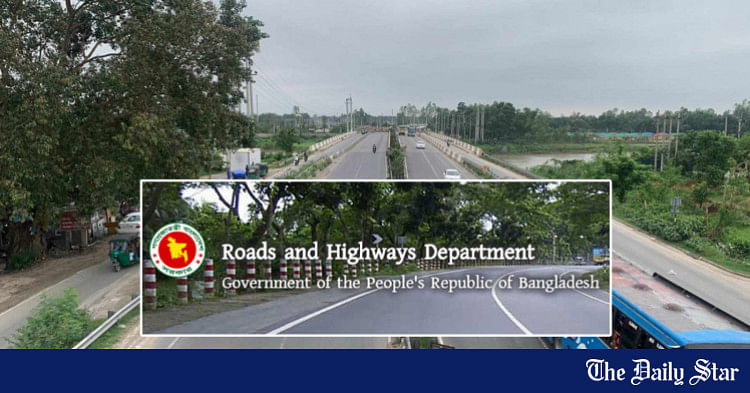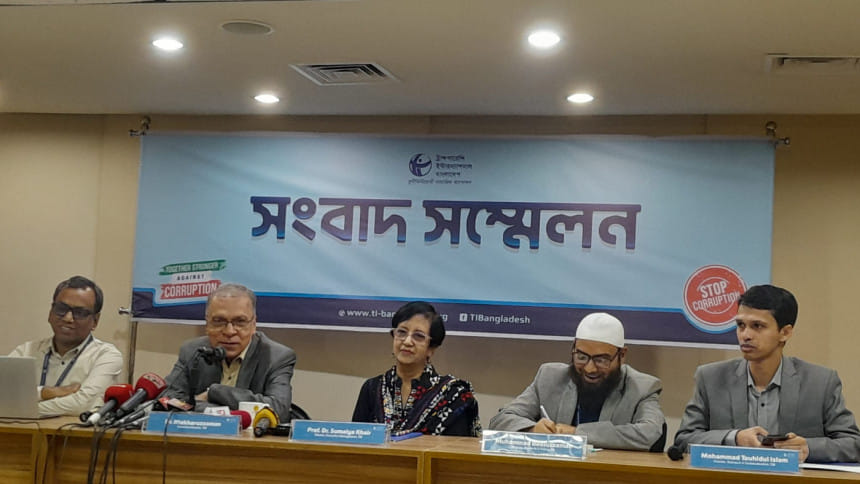TIB finds collusion between politicians, top bureaucrats, contractors led to monopolisation of dev activities
The country lost up to Tk 50,835 crore in the last 15 years due to corruption in development projects implemented by the Roads and Highways Department, according to a Transparency International Bangladesh estimate.
Between 23 and 40 percent of the total work order value were lost because of corruption in fiscal year 2009-10 to 2023-24, said TIB presenting its research at its office in the capital’s Dhanmondi yesterday
Considering the size of allocation, the country lost Tk 29,230 to 50,835 crores, finds the research.
“In the roads and highways sector, development activities have been monopolised through tripartite collusion among politicians, high-ranking bureaucrats, and contractors,” reads its summary.
The colluders influenced policies, procurement, and projects.
“Irregularities and corruption in the implementation of roads and highways development projects have been institutionalised through this collusion, creating ample opportunities for some corrupt politicians, officials, and contractors to illicitly earn large sums of money.”
Photo: Tuhin Shubhra Adhikary
“>
Photo: Tuhin Shubhra Adhikary
On the one hand, the projects are being implemented at high costs due to irregularities. On the other hand, the roads and bridges that have been built are of poor quality, it added.
“People involved in corruption must be held accountable,” TIB Executive Director Iftekharuzzaman said at the press briefing.
A law combating conflict of interest breaches must be enacted to prevent nepotism, irregularities and corruption, he added.
Since no political parties are in power, examples must be set now, he said, adding that actions were not taken against the corrupt previously due political considerations.
It is against the TIB policy to name names publicly, but if the authority asks for identities of the corrupt, the TIB will comply, he said.
Contacted, RHD Chief Engineer Syed Moinul Hasan only said, “I have seen the [TIB] report.”
At the press briefing, TIB Senior Research Fellow Muhammad Julkarnayeen and Research Associate Mostafa Kamal read out the findings.
The research titled “Governance Challenges in the Implementation of Roads and Highways Development Projects” was done on projects that were completed between 2017-18 and 2021-22 fiscal years. However, the projects were initiated between 2010-11 and 2018-19 fiscal years.
The projects that the TIB studied were implemented with domestic funds and each cost less than Tk 1,000 crore.
Based on the data, the researchers made an estimation of all development projects implemented with domestic and foreign funds between 2009-10 and 2023-24.
Asked about the matter, Julkarnayeen said the picture of corruption is almost the same in foreign- and local-funded projects.
Bribery or corruption has taken an institutional shape in this sector, he said.
Asked whether there were shortcomings on the part of the Asian Development Bank, Jica, and World Bank, Iftekharuzzaman said the lenders “cannot avoid responsibility. The goings-on were not unknown to them”.
The researchers took 73 key informant interviews and held 13 group discussions between July 2023 and September 2024.
CORRUPTION
As per the findings, firms pay a bribe of 5-6 percent of the total work order value to secure a contract.
This bribe money is distributed among members of the procurement committee, tender opening and evaluation committee, and officials and employees of the RHD and Road Transport and Highways Division. Each gets a cut ranging from 0.5 percent to 3 percent.
During inspection of the project site and payment, a contractor pays 6-8 percent of the total work order to officials. The project director, other officials and employees get a cut ranging from 0.15 to 1.5 percent.
The amount of bribery in construction-related work orders is estimated to be between 11 and 14 percent. Between 2009-10 and 2023-24, an estimated Tk 13,980-Tk17,792 crore was paid in bribes.
Firms engage in corruption reaching up to 20 percent of the contract value. Thus, the amount ranged from Tk 12,709 to Tk 25,417 crore between FY 2009-10 and 2023-24.
The contractors give a cut to the minister concerned, several MPs, politicians, and top officials, said the report.
The use of substandard and less-than-specified amounts of materials is all too common and the project directors and engineers allow it to happen.
They often use lower-density stones, inferior quality or reduced amounts of bitumen, and skimp on tack coat bitumen.
Even when there are allocations, the contractors do not plant trees, install traffic signs, or spend on maintenance and earthworks.
For example, Tk 74 lakh was allocated in a project for planting trees. But not a single tree was planted.
The typical lifespan of a road is considered 20 years. But the projects completed in the last one to five years under this study show a need for repairs.
Another 2 to 6 percent of the total project value is lost due renting of licences by established contractors and purchasing of work orders from contractors by third parties in an improper process and other irregularities.
The overall corruption in the construction work is 23 to 40 percent.
Researcher Mostafa Kamal said the total development expenditure from the Annual Development Programme for the RHD between FY 2009-10 and 2023-24 was Tk 1,69,449.93 crore.
Of the sum, 75 percent was spent on construction of roads and bridges and 25 percent on land acquisition, utility lines moving and operational costs, he said, citing 48 projects.
The total estimated construction related expenditure is Tk 1,27,087 crore. And given the overall corruption rate in road construction related work, Tk 29,230 crore to Tk 50,835 crore was lost in corruption from 2009-10 to 2023-24.
OTHER FINDINGS
The research says the requirements for contractors are often set in a way that only a few specific firms can meet them.
In some cases, the contractors’ experience is inflated through fraud and secret bidding data is leaked out to favour a particular firm.
Political leaders and senior officials sometimes ask firms with potentials not to bid for certain contracts, further manipulating the process.
From the fiscal year 2013-14 to 2023-24, 15 major firms established dominance through collusion. These firms won roads and bridges construction constructs worth Tk 57,000 crore through the e-Government Procurement process.
The research also found a lack of accountability in project implementation; irregularities and corruption in project prioritisation, project proposal evaluation and appointment of project directors.
TIB recommended amending the guideline for formulating development projects and making all project related information public.




